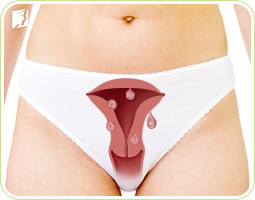
Heavy periods are one of the most common types of abnormal uterine bleeding. As a woman approaches menopause, during her 40s and 50s, she may begin to experience heavy or irregular menstrual bleeding. This is not uncommon and affects around 10 million women. It can be difficult to classify overly-heavy menstrual bleeding, though this is usually defined when a woman experiences a menstrual period that soils tampons and pads within an hour.
A heavy period once in a while is usually nothing to worry about, but periods that are consistently heavy or are interfering with the enjoyment of daily life might indicate a more serious medical problem. Continue reading to learn more about heavy periods.
About Heavy Periods
Successive episodes of excessive menstrual bleeding are known as heavy periods. However, as women all experience periods differently, it is problematic to clearly define how much blood loss constitutes a heavy period. Medically, periods are considered as heavy if the amount of blood loss exceeds 80 ml or enough to soak through a pad or tampon every hour. In addition, a period that lasts longer than seven days also counts as heavy. Heavy periods can also include clots mixed in with the menstrual blood.
Heavy periods may also impede on daily life, interfering with work, school, or sleep and are embarrassing for many women. In severe cases, major blood loss each month can cause a condition called anemia or low red blood cell count.
Heavy periods can occur as a regular part of the menstrual cycle or more infrequently. When they are a regular part of the menstrual cycle they are known as menorrhagia that can also be a symptom of another medical condition, so should be discussed with your doctor.
If you are experiencing abnormally heavy bleeding each month, then it may be helpful to talk with a doctor to determine the cause of the problem. Continue reading to learn all about the different causes of heavy periods.
Heavy Periods Causes
Heavy periods can be caused by several things, these are often the result of hormonal imbalance. The hormones - estrogen and progesterone - control menstruation.
During perimenopause, a woman has fluctuating levels of these hormones. These often causes periods to become heavy periods.
Other Causes
Heavy periods that occur every month may be a symptom of other conditions, such as:

- Uterine fibroids or benign growths in the uterus as a side-effect of using birth control, especially an IUD
- Miscarriage
- Ectopic pregnancy
- Pelvic-inflammatory disease
- As a side-effect of using blood thinners
- Bleeding disorders
- Hypothyroidism
- Uterine cancer
- Ovarian cancer
- Cervical cancer
In some cases, heavy periods can affect fertility. It is important for women to fully understand this condition. Read on to find out more about heavy periods and fertility.
Heavy Periods and Fertility
It is a link between heavy periods and fertility, but first it's better to understand the root cause of the disorder. In the case of hormonal imbalance, it is important to remember that pregnancy can occur anytime before menopause, even if a woman suffers from heavy periods. However, some related conditions, such as pelvic inflammatory disease and some types of cancer can result in infertility or difficulty conceiving. In both of these conditions, early detection is vital in preventing lifelong problems.
A proper diagnosis from a medical professional is vital to determine what is causing heavy periods and abnormal bleeding, even if these episodes are only side effects of hormonal imbalance. Read on to learn more about heavy periods diagnosis.
Heavy Periods Diagnosis
When suffering from heavy periods, your doctor will most likely start with a physical examination and patient history. This may also include a gynecological pelvic examination and Pap smear to test for any abnormalities in the cervix. Depending upon the results of the Pap smear, your doctor may order the following tests.
-

Blood test. This test will determine whether there is a hormonal imbalance.
Pelvic ultrasound scan. This type of test will help the doctor determine whether there are any structural abnormalities in the reproductive organs.
Endometrial biopsy. This test involves taking a small sample from the endometrial tissue inside the uterus. It is most useful in testing for cancer cells.
Hysteroscopy. In this test, the doctor will insert a tube connected to a camera, allowing the doctor to see inside the uterus and detect the presence of any fibroids or tumors.
Once a diagnosis has been made, then the doctor can prescribe a course of treatment. This can range from medication to correct hormonal imbalance to more invasive procedures such as surgery. Continue reading to learn all about the different treatments for heavy periods.
Heavy Periods Treatments
When looking for treatments for heavy periods, it's important to begin with methods that are the least invasive, with the fewest side effects, and progress from there. Efficacy of treatments will be dependent upon whether there is an underlying condition.

If the heavy periods are due to hormonal causes, then some lifestyle changes in combination with alternative medicines is the most effective method to follow. For serious periods, more invasive measures can be taken, though these should always be considered after talking to a medical professional.
If heavy periods are related to other conditions, medicinal treatments may include prescription medications. For example; hormonal birth control. If that medication is not effective or if the underlying condition requires more aggressive treatment, then doctors may recommend surgical procedures depend of the case.
Most experts recommend a combination of lifestyle changes and alternative medicine as a safe and effective way of treating heavy periods. Click on the following link to read a complete and useful list of treatments for heavy periods.
Sources
- -Stewart A, Cummins C, Gold L, Jordan R, Phillips W (January 2001). "The effectiveness of the levonorgestrel-releasing intrauterine system in menorrhagia: a systematic review".
- -Feig, Robert L. and Nicole C. Johnson.. First Aid for the Obstetrics and Gynecology Clerkship.
- -Goodman A, et al. Terminology and evaluation of abnormal uterine bleeding in premenopausal women. http://www.uptodate.com/home/index.html. Accessed June 22, 2011.
- -Abnormal uterine bleeding. The American Congress of Obstetricians and Gynecologists. http://www.acog.org/publications/patient_education/bp095.cfm. Accessed June 22, 2011.

